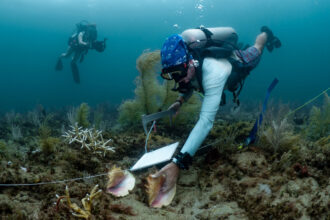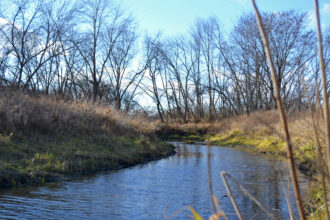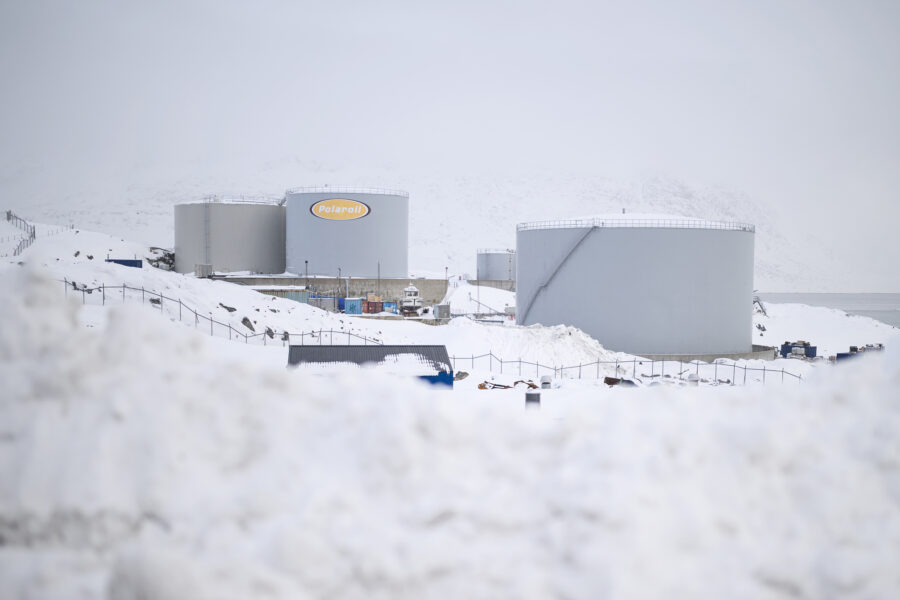Wisconsin Governor Scott Walker joined the crowded field of Republican contenders vying for the White House in 2016 on Monday, and immediately stands out for having one of the poorest records on environmental and climate issues, according to green groups and political experts.
Since taking office in 2010, Walker has dismantled several longstanding policies protecting wetlands and waterways, fast-tracked mining projects, fought climate action, slashed funding for dozens of state scientists and environmental education positions, and impeded development of wind energy in Wisconsin.
“He’s one of the worst,” said Heather Taylor-Miesle, director of the Natural Resources Defense Council’s Action Fund, the political arm of the New York City-based green group. “His state record shows that he has little regard for the facts. All the things he’s done, whether it is rolling back phosphorous pollution standards or deregulating frac sand, points to the big question of ‘why?'”
Walker’s campaign did not respond to a request for comment by press time.
Walker has not officially stated whether he believes climate change is happening and caused by human activities, mainly the burning of fossil fuels. He is, however, a vocal critic of President Barack Obama’s climate policies, arguing White House efforts to reduce carbon dioxide emissions from power plants would be “a blow to Wisconsin residents and business owners.” In April, Wisconsin joined 13 other states in a lawsuit against the Environmental Protect Agency challenging its upcoming carbon regulations. Walker is also a signatory of the “No Climate Tax Pledge,” which aims to stop legislative attempts to raise taxes to fight climate change.
“Gov. Walker makes it clear that he would block the Clean Power Plan, condemning millions of Americans to prolonged exposure to air pollution that can trigger asthma attacks and other serious ailments,” said Daniel Weiss, senior vice president for campaigns at the League of Conservation Voters.
Walker has also helped transform Wisconsin into a critical player in the expansion of fracking nationwide through the production of “frac sand,” a type of quartz sand that helps keep fractures open underground so oil and gas can be extracted more easily. Under his guidance, the number of frac sand mining, processing and transportation facilities in the state have increased from seven in 2010 to 135 today, a 20-fold increase. Walker’s 2016-2017 budget cuts funding for the Department of Natural Resources, the state’s environmental protection agency, by $24.5 million and eliminates 66 jobs, and he supported legislation that would limit local control of frac sand mining operations.
He has also appointed several high-ranking state officials critical of environmental regulation and climate action. Cathy Stepp, a former Republican state senator, owner of a construction company and Walker’s 2011 choice for head of the state’s DNR made news when she said her staff consists of “unelected bureaucrats who have only their cubicle walls to bounce ideas off of,” and who “tend to come up with some pretty outrageous stuff that those of us in the real world have to contend with,” according to Scientific American.
Some experts worry Walker’s anti-environment agenda has created a hostile atmosphere for discussion of climate change in Wisconsin. The state is expected to face several severe climate impacts such temperature increases of up to 7 degrees Fahrenheit by mid-century and heavier rain events. In April, Wisconsin officials voted to ban state employees who manage thousands of acres of forests from working on or talking about global warming. (The ban was eventually amended to prevent staffers from participating in climate advocacy, not all climate work, after a public outcry.)
Walker has polled favorably for months, consistently ranking second or third behind Jeb Bush and Marco Rubio. Now that he is officially in the race, Walker could soon receive a windfall of money that could help solidify his position near the top. Fossil fuel billionaires and top conservative donors Charles and David Koch told donors in April that Walker was their top choice for a Republican nominee in 2016, according to the New York Times. The Koch brothers and their network of like-minded donors are expected to spend $900 million over the next two years to help conservative candidates around the country get elected.
From the archive, ICN’s early look at the climate positions of the GOP presidential contenders:

InsideClimate News reporter Zahra Hirji contributed to this report.
About This Story
Perhaps you noticed: This story, like all the news we publish, is free to read. That’s because Inside Climate News is a 501c3 nonprofit organization. We do not charge a subscription fee, lock our news behind a paywall, or clutter our website with ads. We make our news on climate and the environment freely available to you and anyone who wants it.
That’s not all. We also share our news for free with scores of other media organizations around the country. Many of them can’t afford to do environmental journalism of their own. We’ve built bureaus from coast to coast to report local stories, collaborate with local newsrooms and co-publish articles so that this vital work is shared as widely as possible.
Two of us launched ICN in 2007. Six years later we earned a Pulitzer Prize for National Reporting, and now we run the oldest and largest dedicated climate newsroom in the nation. We tell the story in all its complexity. We hold polluters accountable. We expose environmental injustice. We debunk misinformation. We scrutinize solutions and inspire action.
Donations from readers like you fund every aspect of what we do. If you don’t already, will you support our ongoing work, our reporting on the biggest crisis facing our planet, and help us reach even more readers in more places?
Please take a moment to make a tax-deductible donation. Every one of them makes a difference.
Thank you,









